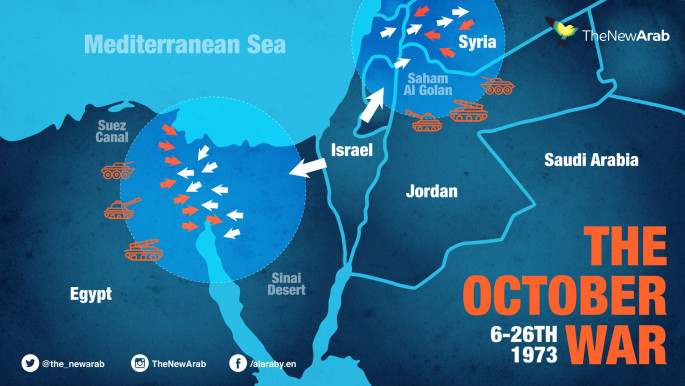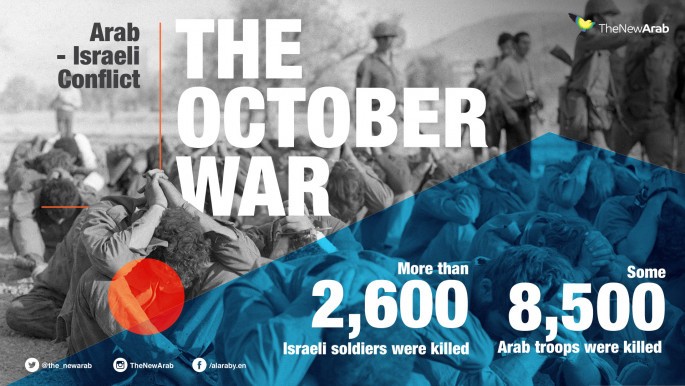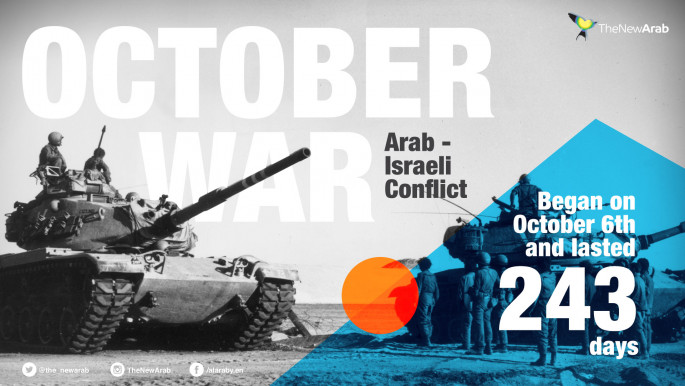The October War: Nothing but a bloody stalemate
Further north, Syria's Hafez al-Assad picks up the phone: "Badr, Badr, Badr," the voice says, the much-anticipated code name to launch the start of the Arab war on Israel.
Within minutes, 150 Syrian wings rocketed across, showing no regard for the 1967 borders separating it from its regional rival.
Six years after the deadly battle, the Arabs had now launched a surprise attack on neighbouring Israel. The target? To recapture vital land seized by Israel during The Six Day War - for Egypt, it was its precious Sinai, for Syria; the treasured Golan Heights.
Sirens trumpeted around Tel Aviv and other parts of Israel as the shock-stricken government struggled to contain the panic on one of the holiest days in the Jewish calendar.
Airstrikes bombarded Israeli positions in Sinai and the Golan Heights as both battle fronts lit up, paving the way for thousands of Arab soldiers and hundreds of accompanying tanks.
Within just hours, victory seemed within reach for the elated Arabs.

In the south, Egyptian engineers quickly mobilised and planted pontoon bridges along the Suez canal - allowing vital machinery, including artillery and tanks, to safely cross over to the thousands of troops already engaged in combat in Sinai.
Completely caught off-guard, Israel was left dumbfounded and its few hundred troops that once manned forts along the borders had been killed, captured or forced to surrender.
But just 15 hours after the first airstrikes, some 250,000 Israeli reservists had mobilised, militarised and marched towards the fronts where Arab troops had raised their flags.
Syria launched a tank assault on the Israeli command centre in Nafakh but was met with resistance as Israel began to fight back - eventually managing to halt Assad's offensive. Minutes later, Damascus was forced to send 500 more tanks to compensate for the drastic losses in what became known as The Valley of Tears.
The brutal battle was a turning point in the war and provided Israel with an upper hand on the northern front.
Israeli fighter jets took to the air and began targeting Syrian infrastructure, destroying tanks and forcing Syrian troops to retreat.
"We are going to press, we are going to push, we are going to bomb and punish as much and as long as we can, until the other side understands the rules of the game," Israel's army chief warned as he stood before the lenses of world media.
With a newly established boost of confidence, Israel pushed deep into the Syria, managing to strike dangerously close to Damascus.
Almost instantaneously, allied Iraqi forces joined the death match, advancing onto the battlefield and pushing back the Israeli invasion from Damascus.  Meanwhile on the Egyptian front - an iconic moment was about to unravel in front of the world media as a white flag was raised by one of Israel's last battalions.
Meanwhile on the Egyptian front - an iconic moment was about to unravel in front of the world media as a white flag was raised by one of Israel's last battalions.
The Israeli commander saluted Egypt's battalion leader and took down the Israeli flag. He handed it to the Egyptians, who in turn raised and saluted their own flag in triumph.
But Egypt's President Anwar Sadat was hungry for more and rejected a British-brokered ceasefire proposal, vowing to continue the offensive until all of Sinai was liberated.
Meanwhile, Israeli commanders Ariel Sharon and Abraham Adan begin preparing for their own assault. "Operation Stout-hearted men" was launched after US intelligence showed a crucial 40km gap between Egypt's battalions.
Sharon and Adan's forces crossed the canal unnoticed. Over in Cairo, Sadat held a premature parade to celebrate the supposed Egyptian victory over Zionist forces. The celebrations continued until Israeli leader Golda Meir announced the latest crucial advancement into Egyptian territory.
Ten days after the start of the war, neighbouring Arab nations grew increasingly agitated.
While some, including Iraq, Jordan and Morocco, had already engaged in battle, oil-rich Arab OPEC members targeted the global economy by tightening their grip on the world's oil pumps.
Prices were raised 70 percent and oil production saw a 25 percent decrease - taking a regional war onto the international stage. The show of solidarity, however, did not affect an Israel already high on victory.
Despite the Arab pressure, Israel's air force penetrated Egyptian airspace and destroyed its defences before swerving towards Ismailiya and Suez city.
 |
On May 28 1974 the disengagement agreement was signed between Israel and Syria, 243 days after the ambitious war began - without much to show for it. |  |
Suddenly, the once-outnumbered Israeli army began receiving hundreds of Egyptian soldiers who had submitted to defeat. Sadat - who had previously rejected the ceasefire - now summoned the Soviet ambassador, requesting a peaceful resolution to the war.
The UN Security Council announced the first of what would be three resolutions, and all sides agree to end the hostilities.
But the very next day, Israel violated the terms of the ceasefire and attacked Syrian soldiers. The attack led to the retrieval of its Mount Hermon vantage point after it was captured by Arab forces on the first day of the war.
The second UN Security Council resolution, 339, was subsequently declared.
Despite global pressure to end the war, Israel continued towards Suez where it kettled the Egyptian army for more than 100 days. The Soviets, now fuming, warned it would take action to impose the ceasefire on the Middle East - angering Washington which responded by raising its nuclear forces to high alert.
Finally, the third UN Security Council resolution 340 was announced; imposing ceasefire in the flared region - this time proving to be fruitful.

Just two days later, after UN emergency forces arrived in Suez, the first talks between Israeli and Egyptian military leaders, General Aharon Yariv and General Mohamed El-Gammasi, took place in a tent on the Cairo-Suez road.
But the period of relative calm ignited once more after Golda Meir made a controversial visit to Israeli soldiers on Egyptian soil. The move provoked the Arabs, who once again threatened to cut a further five percent in oil production every month until Israel's withdrawal.
Over in the United States, US presidential envoy Henry Kissinger boarded Air Force One to begin his diplomatic to-and-fro between the warring nations.
On January 11, Kissinger met with Sadat before heading over to Tel Aviv - a few days later, Egyptian-Israeli army chiefs met once again in the notorious Kilometre 101 tent to sign the agreement that led to the complete withdrawal of Israeli troops from Egyptian territory.
More than one week later, the road to Suez was reopened and a siege of Egypt's third army was lifted after 100 days of Israel blockade.
On May 28, 1974, the disengagement agreement was signed between Israel and Syria, 243 days after the ambitious war began - without much to show for it.
Egypt had retrieved the Sinai region after six years of Israeli occupation, while Syria settled for the capital of the Golan Heights, Quneitra, leaving most of the territory under Israeli control.
For Israel, the surprise war, which began with serious blows, caused severe psychological distress for many years to come. Figures suggest more than 8,500 Arab soldiers were killed, while 2,500 Israeli troops were lost. The death toll was described as a national tragedy by most in Israel, forcing Golda Meir to resign from her position as president.
By all accounts The October War was undoubtedly seen by all participating nations as one of valour and honour, yet 43 years later, its legacy remains one of lives lost, blood spilled, and borders largely unchanged.
Follow Sana Uqba on Twitter: @Sanasiino


